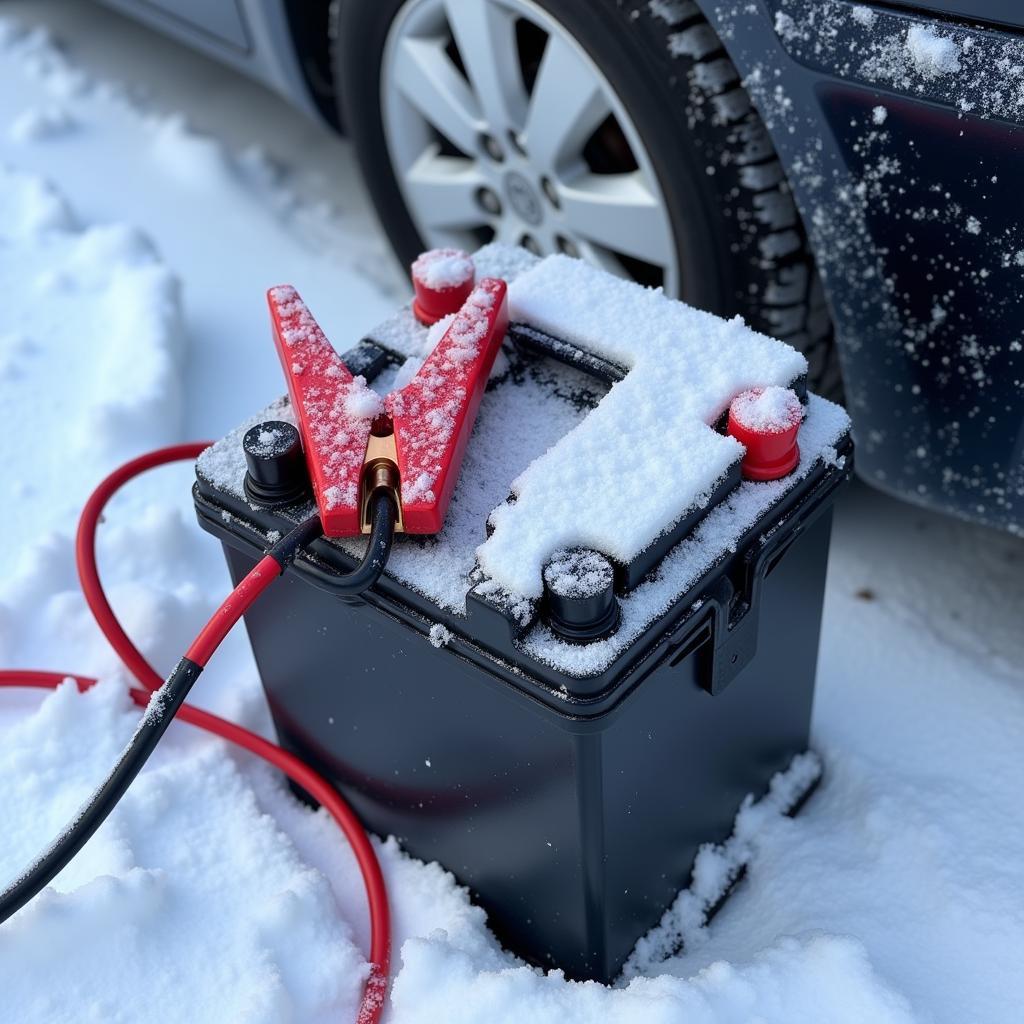Winter’s icy grip can turn a simple morning commute into a frustrating ordeal, especially when your car refuses to start. Winter Car Starting Problems are a common occurrence, but understanding the causes and solutions can save you time, money, and a whole lot of shivering. Let’s delve into the reasons why your car might be struggling in the cold and how to get it running smoothly again. You might find that some mornings your car starting is problem in the morning, especially during winter.
Why is My Car Hard to Start in Winter?
Cold temperatures affect nearly every component involved in starting your car. The engine oil thickens, making it harder for the engine to turn over. The battery’s chemical reactions slow down, reducing its cranking power. Even the fuel can be affected, especially diesel, which can gel in extreme cold. These factors combine to create a perfect storm of winter car starting problems.  Car Battery Struggling in Cold Weather
Car Battery Struggling in Cold Weather
The most common culprit is a weak or dying battery. As batteries age, their capacity decreases, and cold weather exacerbates this issue. If your car has problem starting cold weather, a failing battery is often the first thing to check. car has problem starting cold weather
Troubleshooting Winter Car Starting Problems
Identifying the specific cause of your winter car starting problems requires a systematic approach. Here’s a step-by-step guide to help you diagnose and fix the issue:
-
Check the Battery: The first step is to test your battery. Use a multimeter to measure its voltage. A fully charged battery should read around 12.6 volts. If it’s significantly lower, it’s time for a jump start or a new battery.
-
Inspect the Battery Terminals: Corrosion on the battery terminals can prevent the electrical current from flowing properly. Clean the terminals with a wire brush and baking soda solution.
-
Examine the Starter: If the battery is good, but the engine still won’t crank, the starter motor might be faulty. A clicking sound when you turn the key can indicate a starter problem.
-
Check the Fuel System: Ensure you have enough fuel and that the fuel filter isn’t clogged. In extremely cold weather, consider using a fuel additive to prevent gelling.
-
Consider the Alternator: A faulty alternator won’t recharge the battery properly, leading to starting problems. Have it tested to ensure it’s functioning correctly.
Preventing Winter Car Starting Problems
Prevention is always better than cure. By taking a few proactive steps, you can avoid the frustration of winter car starting problems altogether. Here are some key preventative measures:
- Battery Maintenance: Have your battery tested regularly, especially before winter arrives. Consider replacing your battery every 3-5 years.
- Use a Battery Tender: If you live in an area with harsh winters, a battery tender can help maintain your battery’s charge during periods of inactivity.
- Proper Oil Viscosity: Use the correct oil viscosity recommended by your car’s manufacturer. Thinner oil flows better in cold weather, making it easier for the engine to turn over. winter car problems
- Park in a Garage: If possible, park your car in a garage to protect it from the elements. Even a carport can offer some protection from the cold. 1988 subaru justy car problems
“Regular maintenance is key to preventing winter car starting problems,” advises John Smith, a seasoned automotive technician with over 20 years of experience. “A simple battery check and oil change can save you a lot of headaches down the road.”
Winter Car Starting Problems: FAQs
Here are some frequently asked questions about winter car starting problems:
-
Why is my car harder to start when it’s cold? Cold temperatures thicken engine oil and reduce battery power, making it harder to crank the engine.
-
How can I prevent winter car starting problems? Regular battery maintenance, using a battery tender, proper oil viscosity, and parking in a garage can help.
-
What should I do if my car won’t start in the cold? Check the battery, battery terminals, starter, fuel system, and alternator.
-
How long can I let my car warm up in the cold? Modern cars don’t need to warm up for long periods. A minute or two is usually sufficient. starting car to warm up what problems will happen later
-
Is it bad to jump start a car in cold weather? No, jump starting is a safe and effective way to start a car with a dead battery.
-
Can extreme cold damage my car’s battery? Yes, extremely cold temperatures can significantly reduce a battery’s lifespan and performance.
-
What are the signs of a failing alternator? Dim headlights, flickering interior lights, and a warning light on the dashboard are common signs.
Conclusion: Conquer the Cold and Start Your Car with Confidence
Winter car starting problems can be a real nuisance, but with a little knowledge and preparation, you can keep your car running smoothly all season long. By understanding the causes, following the troubleshooting tips, and taking preventative measures, you can conquer the cold and start your car with confidence. If you’re still experiencing issues, don’t hesitate to reach out to us at AutoTipPro for expert assistance. Contact us at +1 (641) 206-8880 or visit our office at 500 N St Mary’s St, San Antonio, TX 78205, United States.




Leave a Reply